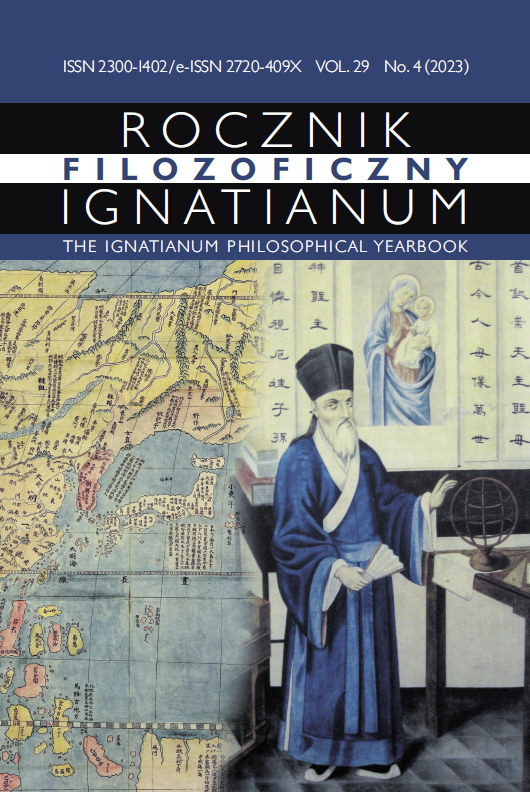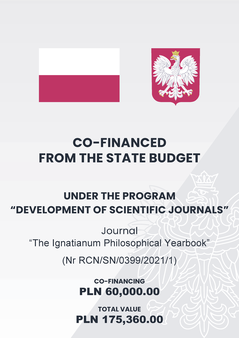Friedrich von Hayek's Views on Morality
Abstract
The article aims to present and analyze the views of F.A. von Hayek on morality (gathered from his various works) and show their meaning for discussion in political philosophy and ethics. It is worth taking up the topic to develop the axiological thought of Hayek, an outstanding thinker whose views are crystallized, coherent, and original. His reflections have the potential to contribute a lot to debates about values, but they either are not known well enough or are wrongly overlooked. In the first part of the considerations, the aim is to explain how, according to Hayek, morality supports individual freedom, and thus the central value in his axiology: society is equipped with morality (along with positive law) to maintain order with a minimum of coercion (the essence of the order of freedom). The second chapter discusses the types of morality distinguished by Hayek. It shows how they complement each other and constitute the moral tradition. These are sets of rules founding, on the one hand, the natural order (its norms correspond to the instinctive attitudes rightly expressed in small communities) and, on the other hand, the extended order (the norms associated with it are not in line with instincts, they regulate the coexistence of strangers entering into anonymous relationships within large societies). In the third chapter, there are Hayek’s views on the justification of the norms of traditional morality presented. In particular, it is about developing the view that accepting moral principles by society is essential to sustaining a libertarian society, regardless of whether we have a satisfactory rationale for them. The final part of the considerations shows the importance of Hayek’s concept of morality in the field of political thought with which Hayek is associated (individualism, liberalism, conservatism), as well as for metaethics (an attempt to recreate the principles constitutive of civilization; a voice in the discussion between the impartial and partisan perspective in ethics).
References
Bartyzel Jacek, W gąszczu liberalizmów. Próba periodyzacji i klasyfikacji (Lublin: Instytut Edukacji Narodowej, 2012).
Burke Edmund, “Letter to a Member of the National Assembly, 251–292”, w: Reflections on the Revolution in France (Oxford: Oxford University Press, 2009).
Duchliński Piotr, Kobyliński Andrzej, Moń Ryszard, Podrez Ewa, O normatywności w etyce (Kraków: Wydawnictwo WAM, Akademia Ignatianum, 2015).
Hayek Friedrich August, Prawo, legislacja i wolność, przeł. G. Łuczkiewicz (Warszawa: Wydawnictwo Aletheia, 2020).
Hayek Friedrich August, Indywidualizm i porządek ekonomiczny, przeł. G. Łuczkiewicz (Warszawa: Wydawnictwo Aletheia, 2018).
Hayek Friedrich August, The Constitution of Liberty (London, New York: Routledge, 2006).
Hayek Friedrich August, Zgubna pycha rozumu. O błędach socjalizmu, przeł. M. i T. Kunińscy (Kraków: Wydawnictwo Arcana, 2004).
Hayek Friedrich August, The Fatal Conceit. The Errors of Socialism (Chicago: The University of Chicago Press, 1988).
Homa Tomasz, Wspólnotowość. W poszukiwaniu spoiwa wspólnoty politycznej (Kraków: Akademia Ignatianum w Krakowie, Wydawnictwo WAM, 2017).
Hume David, Traktat o naturze ludzkiej, przeł. Cz. Znamierowski (Kraków: Nakładem Polskiej Akademii Umiejętności, 1952), ks. III, cz. I.
Kołakowski Leszek, „Mała etyka, 115–170“, w: Czy diabeł może być zbawiony i 27 innych kazań (Kraków: Wydawnictwo Znak, 2006).
Kotarbiński Tadeusz, Pisma etyczne (Wrocław: Zakład Narodowy im. Ossolińskich, 1987).
Nagel Thomas, Equality and Partiality (New York, Oxford: Oxford University Press, 1991).
Popper Karl Raimund, Open Society and Its Enemies (London: George Routledge&Sons,LTD., 1945), vol. I.
Styczeń Tadeusz, Etyka niezależna (Lublin: Towarzystwo Naukowe KUL, Instytut Jana Pawła II KUL, 2012).
Heller Michał, „Filozoficzny program Józefa Życińskiego“, Zagadnienia Filozoficzne w Nauce 48 (2011): 5–22.
Juruś Dariusz, „Czy etyka troski może prowadzić do zaniku troski?”, Roczniki Filozoficzne 2 (2015): 187–206.
Stoiński Andrzej, „Wybrane wątki krytyki utylitaryzmu”, Humanistyka i Przyrodoznawstwo 20 (2014): 369–383.
Šimo Halina, „O F.A. von Hayeka koncepcji wolności”, Przegląd Filozoficzny – Nowa Seria 3 (115) (2020): 55–69.
Michał Heller, „Filozoficzny program Józefa Życińskiego“, Zagadnienia Filozoficzne w Nauce 48 (2011): 5–22.
Ziemińska Renata, „Etyka troski i etyka sprawiedliwości”, Analiza i Egzystencja 8 (2008): 115– 131.
Burke Edmund, “Letter to a Member of the National Assembly”, w: Reflections on the Revolution in France (Oxford: Oxford University Press, 2009), 251–292.
Kołakowski Leszek, „Mała etyka”, w: Czy diabeł może być zbawiony i 27 innych kazań (Kraków: Wydawnictwo Znak, 2006), 115–170.
The Yearbook only accepts materials for publication that are free of all conflicts of interest, and that in no way involve conflicts over authorship, copyright, etc. The Editors will take action against any cases of plagiarizing, ghostwriting1, guest/honorary authorship2, etc. Where co-authored work is concerned, the Author listed first is expected to take responsibility for the submission, and is required to make clear the contributions of all of the Co-Authors involved. In the event of the publication owing its existence to funding dedicated to this purpose, this fact should be made clear: e.g. in any note of thanks/acknowledgement, or in a footnote, etc. Explicit notification should be given of any form of reprinting, with the appropriate evidence of permission to publish being furnished as required. Any impropriety on the part of Authors/Reviewers risks exposing them to appropriate responses from the relevant institutions.
______
1 This term refers to instances of a person who has made an essential contribution being omitted from the list of authors, or from notes conveying gratitude and/or acknowledgement.
2 This occurs when a person who has made either an insignificant contribution or no contribution at all nevertheless appears on the list of authors.





